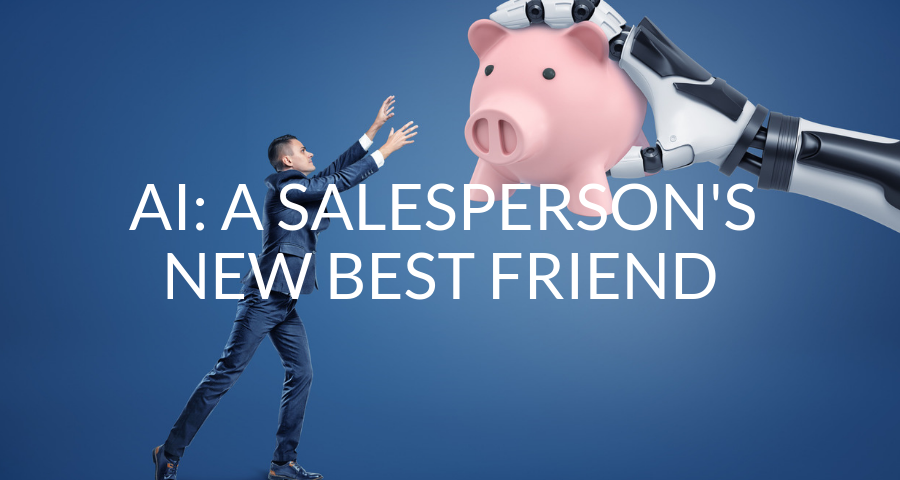In 2017, artificial intelligence (AI) joined an executive board for the very first time. In 2019, OpenAI finished its AI that can mimic natural human writing, but deemed it “too dangerous” to release.
AI has always been seen as something that enhances business processes involving data. But now it also has the capability to improve traditionally human-driven functions as well. The latest example of this can be seen in its partnership with sales teams.
That’s not to say AI sales agents will soon be the norm – trust is too important a part of sales, and prospects are far more likely to trust a human than an AI. But as the sales role becomes more data-driven, it will become smarter and more effective – and AI will chip in more value.
The rise of AI can be surprising, but it shouldn’t be feared. AI should be seen for what it is: a valuable assistant that can make your sales teams even more effective.
Here are five compelling reasons to embrace AI and see its value for your sales, and your bottom line.
Help Reps Spend More Time Selling
The average sales rep spends just 36.6% of their time selling. The rest is spent on admin, answering emails, and managing customer relationship management (CRM) tools.
Of course, time spent managing CRM is time well spent, as these tools hold all your data on prospect demographics, purchase history, and buying habits.
But if those tools contain outdated information, lack intuitive functions, and take a lot of time and effort to update, nothing will happen quickly.
 AI promises to help streamline and even automate the admin burden associated with CRM.
AI promises to help streamline and even automate the admin burden associated with CRM.
Tact, a CRM platform with AI features, is already showing promise here. Offering a sales-focused virtual assistant, Tact uses AI to automate admin, offer relevant information on customers you’re speaking to. It can even remind reps about meetings, automatically log activities into your CRM, and make calls for you. Using touch, voice, or text, you can use Tact to process data from across different CRMs, calendars, emails, or databases.
This automation could even go further, with AI taking on data analysis tasks that reps don’t have time for or can’t do themselves. For instance, while a single team leader will never have the time to process every call a rep has made, an AI can. By analyzing these calls, the AI could offer useful information on how to train reps and improve call quality.
Get Intelligent Recommendations
Predicting the next best action for prospects has always been an important part of sales. But using intuition only goes so far. Data-driven models offer more helpful predictions, and AI helps make these models even better.
For instance, Salesforce’s AI-powered “Einstein” add-on analyzes historical sales data to automatically prioritize the most promising leads in your pipeline. It can then explain if a lead will convert or not, and why.
Another feature, Einstein Opportunity Insights, analyzes past sales and monitors customer interactions to identify unique patterns in your sales cycle. It can also understand whether a deal is on track or at risk.
“Wherever there is data, AI can help it deliver more value. This also applies to sales,” explains Takanori Nishida, a researcher at Sansan’s Data Strategy and Operation Center (DSOC) R&D Group. “AI can help predict when a new prospect might need your solutions. And it will make it easier for salespeople to create target lists and marketing strategies.”
Improve Customer Engagement
AI can also augment how you engage, nurture, and qualify leads.
A promising development in this area comes from Gong.
Gong’s cloud-based AI engine automatically records and transcribes sales calls. By combining natural language processing with machine learning, it then analyzes conversations to help sales staff make more effective pitches.
AI doesn’t look to replace the human touch in a sale here. Instead, the focus is on how companies can use AI to improve sales processes.
Build Prospect Networks
And AI isn’t just for improving engagement. It also helps salespeople turn up new prospects to connect with. One approach is based on shared networks.
Sansan’s business card scanning solution uses “AI to capture data from business cards and suggest lookalike contacts from colleagues’ contacts,” Nishida explains. Here, too, AI is a deeply intelligent and impartial assistant, rather than competition.
“For example, if I’m a researcher, I’m probably looking to connect with other researchers and R&D teams,” Nishida adds. “So, Sansan might recommend I get in touch with a researcher my colleagues met previously. This helps salespeople find ways of approaching new contacts at target companies.”
Take the Ambiguity Out of Decisions
The average rep will make several decisions as they work with customers and prospects. Sales team leads make even more, as they also have to manage team performance.
From prices and deal amounts, to finding upsell opportunities and forecasting, manually looking at the data and making all these decisions can be difficult and time consuming.
This is another area where AI can help. Harvard Business Review identifies how AI is changing sales by giving data-driven recommendations on upselling and cross-selling, forecasting, price optimization, and even rep performance management.
AI: Friend not Foe, and Rising Star of Sales
Whether you’re looking for ways to enhance what your reps do, or save them time on admin tasks, AI can help.
And crucially, it can help without threatening jobs or competing with your team.
By embracing AI, you can get the most out of your data and resources, close more deals, and generate more revenue.



